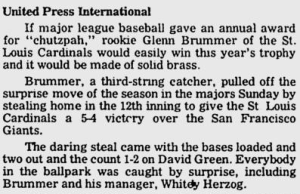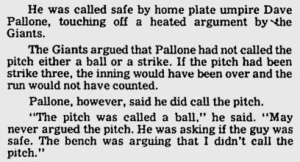Unless you’re a backup catcher with exactly one stolen base in your career. Then it’s a great play … especially if it works.
That’s what happened back in 1982, four hours into this game on what was no doubt a steamy August afternoon in St. Louis. Tom Tango posted a discussion of this play on his website last month, and I thought it might also interest our readers here at HHS.
More after the jump on the rules implications of stealing home with two strikes on the batter.
This was part of the UPI account of the game.
So, not only were there two strikes, but also two out. That additional detail didn’t escape the notice of the opposing Giants, as the UPI account goes on to relate.
So, did the umpire call the pitch as he claims to have done? You be the judge. Here’s the play.
I don’t know about you, but I’ve seen a lot of games and don’t ever recall the umpire calling a pitch while standing in the batter’s box. Most umpires, of course, only signal when strikes are called so the absence of Pallone making a strike call might plausibly be inferred as a ball call. But, the more likely explanation is that Pallone forgot all about the throw being a pitch and just got himself in position to make a call on the tag play at home.
I was interested in how often a play like this (or any steal of home with two strikes) had happened. But, unfortunately, B-R’s Event Finder was of no help as, surprisingly, stolen bases are not among the events that can be searched (even searching the more generic “Balls Not In Play”, meaning batted balls not in play, fails to turn up any stolen bases).
As rare as the play may be, the rules of baseball do cover it, as noted by one of the commenters on Tango’s blog. Specifically, rule 6.05 (n) which reads:
6.05 A batter is out when…
(n) With two out, a runner on third base, and two strikes on the batter, the runner attempts to steal home base on a legal pitch and the ball touches the runner in the batter’s strike zone. The umpire shall call “Strike Three,” the batter is out and the run shall not count; before two are out, the umpire shall call “Strike Three,” the ball is dead, and the run counts.
And, there’s also rule 7.07 that would come into play
7.07 If, with a runner on third base and trying to score by means of a squeeze play or a steal, the catcher or any other fielder steps on, or in front of home base without possession of the ball, or touches the batter or his bat, the pitcher shall be charged with a balk, the batter shall be awarded first base on the interference and the ball is dead.
So, what do you think? Did the umpire make the right call? Or, did he miss the call entirely by failing to rule ball or strike on the pitch? And, what if the batter, with two strikes on him and an opportunity to end the game, had stood his ground and possibly even swung at the pitch? (try visualizing that scene)


